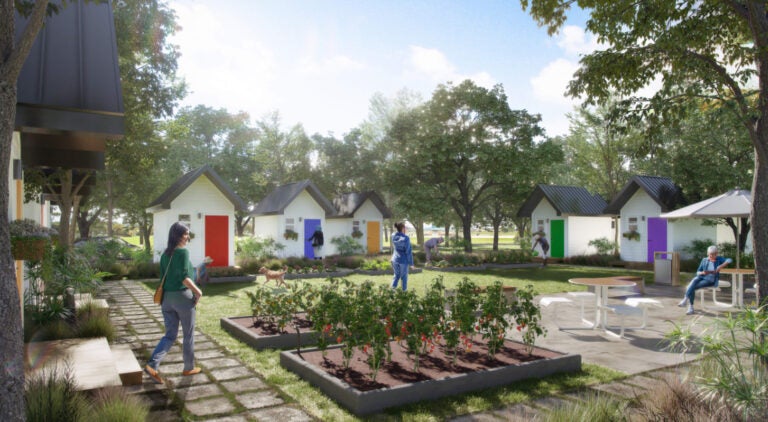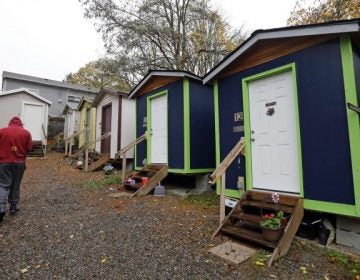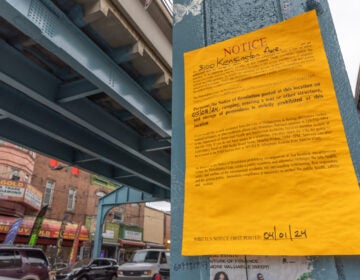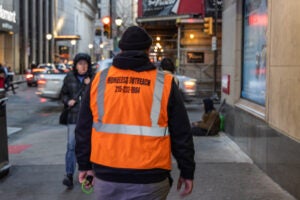Sanctuary Village is exploring suburban alternatives for tiny homes after Philly setback
The nonprofit is assessing interest, opportunities and funding in Montgomery, Bucks and Delaware counties.

A rendering of the Sanctuary Village project. (Courtesy Sanctuary Village)
From Philly and the Pa. suburbs to South Jersey and Delaware, what would you like WHYY News to cover? Let us know!
Sanctuary Village, a nonprofit organization, is exploring options to build tiny homes for the unhoused in the suburban counties around Philadelphia, said Staci Scott, the organization’s first executive director. Scott, who declined to provide specific locations, mentioned the organization is assessing interest, opportunities and funding in areas such as Montgomery, Bucks and Delaware counties.
This pivot comes after Philadelphia Mayor Cherelle Parker in March halted the nonprofit’s plans to establish the city’s first tiny home village in Northeast Philadelphia, a project green-lit by the previous administration in 2021.
“We had plans built. We were ready to go. We thought we were about to break ground,” Scott said.
The decision came as a surprise to Sanctuary Village leaders, including Scott, who took over as executive director five weeks ago, coinciding with when construction was initially planned to start. Scott, who served on the board for about two years, expressed a shared sense of disappointment and frustration among the team.
Cathy Farrell, a founding board member, echoed this sentiment, stating that the nonprofit had invested considerable time and resources in collaboration with the city and the Office of Homeless Services over three years.
“It was pretty devastating, but I’m sure the mayor and her administration have their reasons,” Farrell said.
In response to the setback, the nonprofit’s staff and board are recalibrating their strategy to potentially focus on suburban regions outside Philadelphia.
“For now, it gives us a little bit of time to take a step back, to breathe a little bit, to look at our model, tweak it if necessary, build upon the lessons learned, and then just move forward,” Scott added.
The organization is also considering enhancing their services to better meet the needs of the unhoused community, which includes adding case management services and plumbing in the units. Originally, the project was designed to serve women aged 55 and older without in-unit plumbing, relying on a shared kitchen and bathrooms.
Despite the project’s uncertain future, Scott remains hopeful about expanding services to a broader demographic. She speculated that the city’s decision might be related to broader administrative issues, such as budget problems within the Office of Homeless Services. The mayor’s office did not respond to requests for comment.
Critics have raised concerns about the feasibility of the tiny homes, describing the initial proposal as inadequate. Stephanie Sena, a Villanova professor and nonprofit leader, criticized the project’s design.
“It was basically like a wooden shed that doesn’t have running water, no bathroom, and there would be a centralized bathroom,” Sena said.
Despite the criticism, Sanctuary Village leaders insist on pushing forward.
“We very much still want to try to pursue this model,” Farrell said. “Wherever it may be needed, wherever it may be able to do some good. Does that mean Philly? Maybe. Does that mean somewhere else in a suburb? Maybe. We are trying to get all of our ducks in a row.”

Get daily updates from WHYY News!
WHYY is your source for fact-based, in-depth journalism and information. As a nonprofit organization, we rely on financial support from readers like you. Please give today.







